Diplomatic Bluebook 2019
Chapter 4
Japan's Diplomacy Open to the Public
2 Japanese Taking Active Roles in the International Community
(1) Japanese Taking Active Roles in International Organizations
International organizations are founded to serve the common interest of the international community. People of various nationalities join these international organizations and draw on their skills and traits to create an environment where people of the world can live in peace and enjoy prosperity. There are many international organizations working to solve global issues that cannot be addressed by individual countries; for instance, conflict prevention/peacebuilding, sustainable development, food, energy, climate change, disaster prevention, health, education, labor, human rights/humanitarian issues, and gender equality, among others.
Talented individuals with specialized knowledge, passion and capabilities to contribute to the world's interests are needed so that international organizations can competently perform their duties and fulfill the roles expected of them. In order for each international organization to pursue its agenda, in addition to policy contributions and financial contributions through regular budget and voluntary contributions, Japan also makes contributions in terms of human resources through the active roles of Japanese staff.
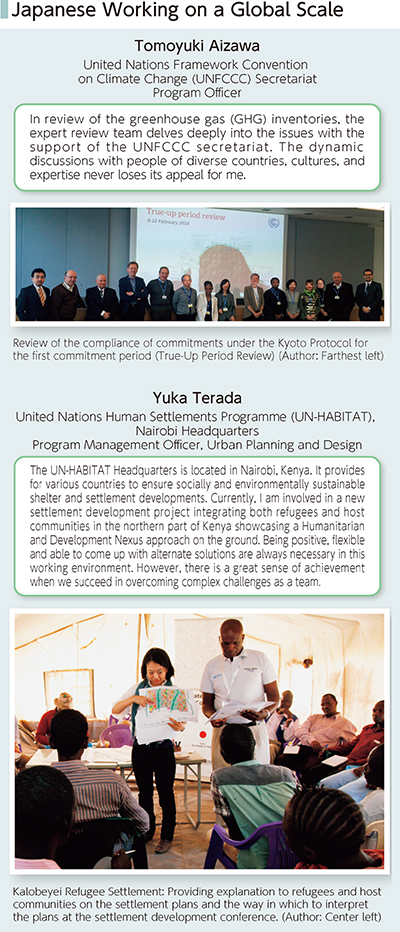
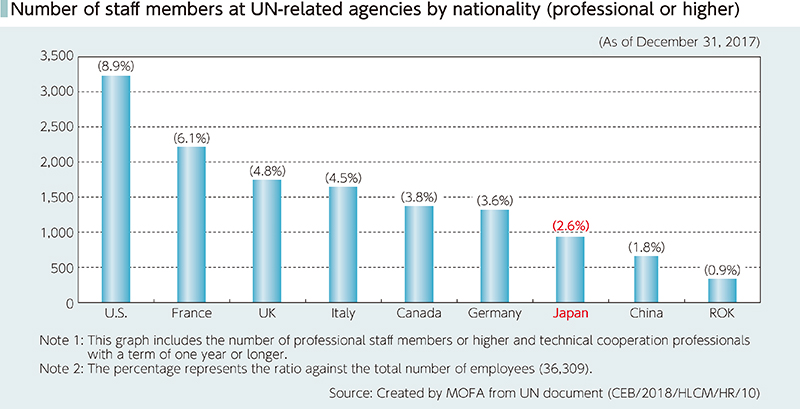
Currently, about 850 Japanese nationals are working as professional level staff in UN-related agencies around the world. The number of Japanese employees continues to increase, signifying the expansion of Japan's personnel contributions. However, taking into account the number of professional level staff of other G7 member countries, which exceeds 1,000, Japanese personnel contribution remains insufficient.
The Government of Japan has set the objective of increasing the number of Japanese staff working at UN-related agencies to 1,000 by 2025. To this end, MOFA is actively recruiting, training and supporting, in collaboration with universities and related ministries and agencies, Japanese nationals who can play active roles and make a contribution on the global stage. As part of this effort, to identify talent, MOFA works on PR initiatives, including organizing guidance sessions to provide information on the fascination in working for an international organization and recruiting process, as well as hosting job fairs when human resource staff from international organizations visit Japan and when Japanese staff return home from abroad.
Furthermore, MOFA seeks to develop young people dispatched to international organizations by strengthening and expanding the Junior Professional Officer Programme (a system of sending young Japanese nationals who aspire to work in international organizations as regular staff for two years in principle to provide them with opportunities to gain necessary knowledge and experience in international organizations and to aim for regular employment after their dispatch). MOFA is also working to coordinate with international organizations and gather information for the promotion and employment of Japanese staff, including those at the mid-career and managerial level.
MOFA is also committed to supporting for the application process, providing useful information including vacancy information and using its website and social media such as Facebook and Twitter to Japanese candidates seeking positions at international organizations.
A larger number of talented Japanese people taking on active roles in international organizations are expected to further enhance Japan's presence in the international community more visibly.
Japanese staff are involved in various fields and duties at different locations, but they share the same goal of solving various issues facing the international community (see Column “The Voices and People Who Have Supported the United Nations” and “Japanese Working on a Global Scale”).
In addition, Japanese staff at international organizations may play the role of a “bridge” between the international organization and Japan. For example, Japan's successful co-hosting of the ministerial meeting of the Tokyo International Conference on African Development (TICAD) in October 2018, with the United Nations Development Programme (UNDP), World Bank (WB), and African Union Commission (AUC) was underpinned by the important role played by Japanese staff members, who understand the stance and work procedures of both Japan and partner organizations. In this manner, the presence of Japanese staff in international organizations has vital significance also from the perspective of promoting Japan's diplomatic priorities.
Moreover, increasing the number of globally-minded human resources who have professional experience at international organizations and can play an active role on the international stage will in turn lead to enrichment of human resources of Japan, contributing to the development of Japan as a whole.
MOFA will continue to be even more active in undertaking measures to increase the number of Japanese nationals working in international organizations so that a larger number of competent Japanese nationals who have high aspirations and passion to contribute to solving global issues can take part in international organizations.
Hiroto Mitsugi, Assistant Director-General,
Forestry Department, Food and Agriculture Organization (FAO)
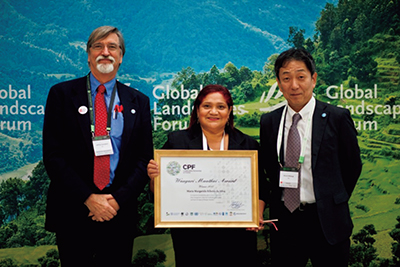 Recipient of the Wangari Maathai Forest Champion Award (center) hosted by the Collaborative Partnership on Forests CPF, comprising 14 international organizations related to forests, and the author (right) (December 2017, Bonn, Germany)
Recipient of the Wangari Maathai Forest Champion Award (center) hosted by the Collaborative Partnership on Forests CPF, comprising 14 international organizations related to forests, and the author (right) (December 2017, Bonn, Germany)I am writing this manuscript on December 1, 2018, in Bonn, Germany, where the Global Landscapes Forum (GLF) is currently being held. Various meetings on topics of environment such as biodiversity, cities and forests, landscape, and climate change are taking place in the month before and after the GLF.
These meetings address forests from various perspectives - as sources of rich biodiversity and water, as greenery that makes city life more pleasant, as integral parts of landscapes that harmonize nature and production activities, and as sinks for carbon dioxide. The FAO's role is to lead these discussions, provide knowledge and experience to stakeholders on forests and implement concrete actions.
To sustainably utilize forests as global assets, we need collaboration and action by various stakeholders beyond national borders, such as national governments, local governments, the private sector, research institutes, and local residents (including producers and consumers), with their understanding of forests. Unless this happens, seemingly impressive discussions on the international stage will be meaningless.
Recent developments in science and technology have made it possible that anyone can learn about the current state of global forests and their changes using data and images from satellites. Additionally, various data and information on forest carbon stock and several cases of activities on sustainable forest management have also been reported to us. We are likely to access substantially more information and knowledge related to forests than previously. Nevertheless, deforestation continues, albeit at a slightly slower pace.
What could we do to promote more people's understanding of forests and prompt actions to halt deforestation?
The GLF meeting that I am currently attending has called for the creation of “stories from forests.” Besides those who live by forests or sustain their livelihood through forests, such as from timber, mushrooms, and beekeeping, many people, particularly those living in cities, do not know much about forests. For us to take concrete actions, it is necessary to help people around the world imagine forests and empathize with the importance of co-existing with forests through stories from forests, and not just based on observational data.
The theme for the International Day of Forests on March 21, 2019 is “Forests and Education.” We hope to tell stories from forests, expand the image of forests in the minds of adults as well as children, who will lead the next generation, and thereby promote concrete actions. Please join us in thinking and participating.
Miwa Kato, Director, Division for Operations,
United Nations Office on Drugs and Crime (UNODC)
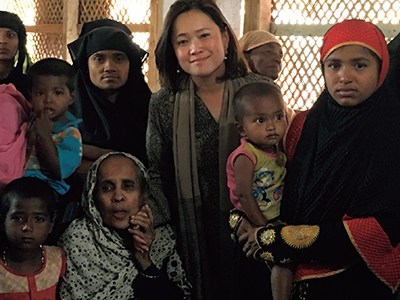 A site in Cox's Bazar, Bangladesh, where displaced “Rohingya” women are receiving assistance (author in the center)
A site in Cox's Bazar, Bangladesh, where displaced “Rohingya” women are receiving assistance (author in the center)Two decades ago, I joined the fascinating world surrounding the United Nations (UN). Just having finished my graduate studies on International Relations, I was full of youthful passion, determined to contribute to making a better world. Since that time when I landed my very first job at the Permanent Mission of Japan to the UN in New York covering the Security Council, I have been blessed with a series of exciting assignments, working with or for the UN, changing my base from New York, The Hague, Vienna, Kabul, Cairo, and Bangkok. I still remember fondly though, how my mentor into the diplomatic world explained to me that the “United Nations is its own universe filled with political power games” teaching me the perfect Japanese idiom to describe that state as I struggled to learn professional Japanese. The UN is an organization rooted in the ideals of mankind. At the same time, it is also a place where multiple divergent interests, ideals and realities all intersect, reflecting the complex world we live in. Being passionate about the ideals of the UN Charter alone is not enough to get the necessary results of improving people's lives. One must be strategic in one's efforts, making tough decisions about what to prioritize and how to push, not losing sight of the required outcomes the UN should produce.
In this complicated “universe” that is the UN, major reforms are currently being introduced under the strong leadership of Secretary-General António Guterres, to transform the organization to be more functional and capable of delivering results. In order to resolve the many challenges shared by mankind in the 21st century and to make dramatic improvements in people's lives, bold and innovative actions are needed to solve concrete problems, not being bureaucratically restricted by systems and rules that are out of step with the current reality. It is crucial to determine the necessary actions, communicate clearly, create consensus and properly deliver results, while taking into account the varied perspectives of countries and people involved. This might seem obvious but fostering such a mindset in the bureaucratic culture of the UN diplomacy is still a challenge. Nevertheless, many UN staff and diplomats from various countries are working hard to push for transformation in the way the UN works, reminding ourselves “if not now, then when?”
Reflecting the complex world we live, there are inevitably those disappointing moments when collisions of national interests among Member States or bureaucracy limit the scope of what the UN can accomplish. But we need resilience not to be discouraged by, and be limited to, the “reality” of today. We need to have courage and commitment to push for necessary changes. So, I work each day striving to create conditions that maximize the impact of hard-working staff in the frontline of the UN's work. We owe this to the people who look to the UN for support. Furthermore, I also believe that the UN will be strengthened by better reflecting the sentiments and ingenuity of the people around the world, bringing solutions to our common problems and creating new opportunities and alliances. With the dramatic technological advances including the transformational connectivity offered by the internet and social media, it should be possible to discover new working modalities and solution finding methods that incorporate perspectives from outside of the UN much more extensively. I am excited to think of what the UN can do, and can be, tapping into this great potential.
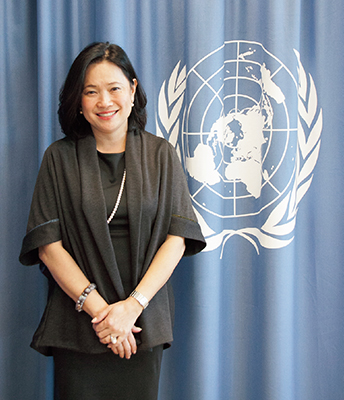 Working at the Vienna UN Headquarters since June 2018, after completing field assignments in the Middle East and Asia
Working at the Vienna UN Headquarters since June 2018, after completing field assignments in the Middle East and AsiaTurning to Japan - a country that attained an extremely high-level of socio-economic development after the defeat of World War II and faced multiple natural disasters, based on a strong conviction for pacifism and internationalism. As such, Japan is one of the countries from which people from around the world want to learn the secrets of its success. The diligence and integrity of the Japanese people, often reflected in their style of factoring other people's feelings into solutions, are qualities that the UN itself can learn from to strengthen our core values. I hope that as many Japanese people as possible would take interest in, and get involved with, the UN and contribute to making the UN stronger. Let us all come together and share our ideas for realizing the full potential of the UN and human society.
(2) Activities of Non-Governmental Organizations (NGOs)
A Development Cooperation
In the interest of leveraging the capabilities of organizations outside of the Japanese government to conduct all-Japan diplomacy, NGOs are becoming increasingly important as organizations providing support to various nations, including developing countries. It is estimated that in Japan there are over 400 non-governmental organizations (NGOs) engaged in international cooperation activities. Most of them are familiar with local needs at the grassroots level and provide flexible and detailed support in developing countries/regions with various challenges such as poverty, natural disaster, and conflicts, and the roles NGOs can play in development cooperation is expanding significantly.
Through NGOs, MOFA actively provides Official Development Assistance (ODA) via financial cooperation in the form of grant assistance for economic and social development projects implemented by Japanese NGOs in developing countries/regions (Grant Assistance for Japanese NGO Projects). The projects cover a wide range of assistance, including health/medical/hygienic care (maternal and child health, countermeasures for tuberculosis/HIV/AIDS, water/hygiene, etc.), rural development (environmental development/technological improvement for agriculture), support for the people with disabilities (vocational training/job seeking assistance, provision of wheelchairs for children, etc.), education (building schools, etc.), disaster risk reduction, and the clearance of landmines and unexploded ordnances (UXO). In 2018, 59 Japanese NGOs implemented 106 projects in 37 countries and regions including Asia, Africa, and the Middle East under the Grant Assistance for Japanese NGO Projects. Moreover, subsidies are provided with the objective of supporting activities that enhance the project execution capabilities and expertise of Japanese NGOs and that promote NGO projects (NGO Project Subsidies).
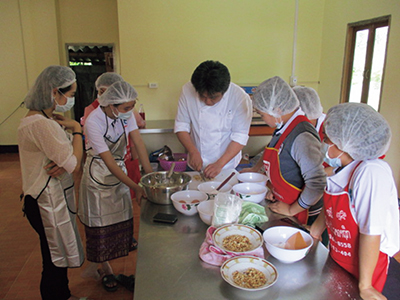 Job Creation Project for Persons with Disabilities in Houaphanh Province, Laos (Grant Assistance for Japanese NGO Projects. Photo: Asian Development with Disabled Persons (ADDP))
Job Creation Project for Persons with Disabilities in Houaphanh Province, Laos (Grant Assistance for Japanese NGO Projects. Photo: Asian Development with Disabled Persons (ADDP))Japan Platform (JPF) was established in 2000 with the aim of conducting emergency humanitarian assistance more effectively and promptly through cooperation and partnerships among the Government, NGOs, and business communities at the time of large-scale natural disasters or conflicts. As of the end of December 2018, 42 NGOs are members of JPF. In 2018, JPF launched emergency response to earthquake and tsunami in Lombok and Sulawesi, Indonesia and emergency response to floods in Laos and Mongolia, while continuously implementing response programs for humanitarian crises in Myanmar, Syria, Iraq and their neighboring countries. Humanitarian assistance was also provided to Afghanistan, Yemen, Palestine, South Sudan, etc.
Japanese NGOs conduct a number of activities using contributions from supporters and the income earned from their own business. In recent years, there is growing public interest in Corporate Social Responsibility (CSR) and Creating Shared Value (CSV), an increasing number of companies with technologies and funds implement social action in developing countries in partnership with NGOs with much knowledge on development cooperation.
As seen thus far, NGOs assume important roles in the area of development cooperation. Identifying such NGOs as partners in development cooperation, MOFA and JICA provide indirect support for NGO activities through various policy measures with the aim of enhancing their capacity and expertise as well as developing human resources so that NGOs can strengthen the foundation for their activities and perform further tasks. In 2018, MOFA implemented four programs, namely the “NGO Consultant Scheme,” “NGO Overseas Study Program,” “NGO Internship Program” and “NGO Study Group.”
Moreover, the general meeting of the “NGO-MOFA Regular Consultation Meeting” was held to promote dialogue/coordination with NGOs. The ODA Policy Council to discuss ODA policy and the Partnership Promotion Committee to discuss support and cooperation measures for NGOs were also held. In addition, MOFA has been working on initiatives to achieve the Sustainable Development Goals (SDGs) while conducting exchanges of views with various stakeholders, including NGOs, through the “SDGs Promotion Roundtable” and other means.
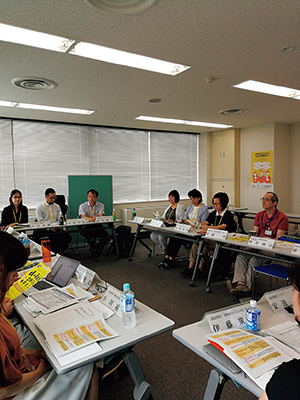 The 1st NGO Consultants Liaison Meeting of FY 2018 (June 21, Tokyo)
The 1st NGO Consultants Liaison Meeting of FY 2018 (June 21, Tokyo)B Partnership in Other Major Diplomatic Areas
MOFA also cooperates with NGOs in areas other than development cooperation. For instance, at the 62nd session of the UN Commission on the Status of Women (CSW) held in March 2018, Ms. Yumiko Tanaka (visiting professor at Josai International University) represented Japan, and NGO representatives actively participated in discussions as members of the Japanese delegation. At the 73rd UN General Assembly, Ms. Akane Miyazaki (professor at Japan Women's University) attended the Third Committee, which deals with a range of social and human rights issues, as an advisor to the representatives of the Government of Japan. In addition, the Government of Japan has initiated dialogues with civil society including NGO representatives and experts on matters related to government reports to be submitted based on various conventions on human rights, third country resettlement projects, and the National Action Plan on Women, Peace and Security based on the UN Security Council (UNSC) Resolution 1325 and related resolutions.
Japanese NGOs are also increasing their presence in the area of disarmament, and MOFA has been actively promoting cooperation with them. For example, in the area of conventional weapons, cooperation such as participation of MOFA officials in seminars hosted by NGOs, clearance of mines and unexploded ordnances, and risk reduction education projects are going on.
Furthermore, in the area of nuclear disarmament, MOFA has been conducting dialogues with various NGOs and experts. The Government supports the activities of NGOs and others to convey atomic bomb survivors' testimonies on the realities of the disaster of the use of nuclear weapons to the international community through the commissioned projects called “the Special Communicator for a World without Nuclear Weapons” and “the Youth Communicator for a World without Nuclear Weapons.” As of December 2018, a total of 293 Special Communicators on 97 occasions and a total of 324 Youth Communicators on 30 occasions have been dispatched to the world through these commission programs.
As for the measures against transnational organized crime, especially in the area of trafficking in persons, coordination with civil society including NGOs is essential. With this in mind, the Government actively exchanges opinions with NGOs and other stakeholders to identify recent trends of trafficking in persons and to consult on appropriate measures to tackle them.
(3) Japan Overseas Cooperation Volunteers (JOCV) and Senior Volunteers (SV)
The Japan Overseas Cooperation Volunteers (JOCV) is a JICA program aimed at cooperation/assistance for the economic and social development of the communities of the developing countries where young people from 20 to 39 years of age, who possess skills, knowledge and experience, live and work together with local people in these countries, fostering mutual understanding. As of the end of October 2018, 44,468 JOCVs had been dispatched to 91 countries in total. Dispatched members have been engaged in about 200 types of work in ten areas: planning administration, commercial/tourism, public utility works, human resources, agriculture, forestry and fisheries, health/medical care, mining, social welfare, energy and others.
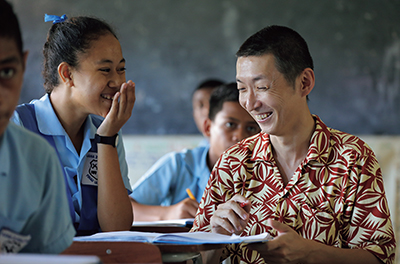 Japan Overseas Cooperation Volunteers teaching mathematics in some more (Atsushi Shibuya / JICA)
Japan Overseas Cooperation Volunteers teaching mathematics in some more (Atsushi Shibuya / JICA)The JOCV program, launched in 1965 and celebrated its 50th anniversary in 2015, received the Philippines' Ramon Magsaysay Award1, otherwise known as the Asian Nobel Prize in July 2016. The JOCV has been highly appreciated by developing countries as representing the “Visibility of Japan's International Cooperation.” In 2018 Japan concluded international agreements for dispatching JOCVs with Serbia and Guinea.
The Senior Volunteers (SV) program is a program to dispatch people aged 40 to 69 who have wide-ranging skills and rich experiences to developing countries. The program has been expanding every year since its launch in 1990. By the end of October 2018, a total of 6,450 volunteers had been dispatched to 75 countries and cooperated in the same ten areas as the JOCV program. The SV program has drawn increasing interest in recent years from the perspective of supporting to start a new life after retirement and utilizing the rich experiences and expertise of retired senior citizens.
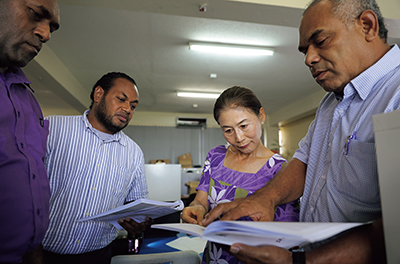 Senior Overseas Volunteers helping revise educational curriculum and teaching guidelines in Fiji (Photo: Atsushi Shibuya / JICA)
Senior Overseas Volunteers helping revise educational curriculum and teaching guidelines in Fiji (Photo: Atsushi Shibuya / JICA)The JOCV and SV programs are supported by the high aspirations of people who are keen to provide cooperation for the sake of economic and social development and reconstruction of developing countries. MOFA actively promotes these programs, considering them as a core of participatory international cooperation by citizens. As of the end of October 2018, 1,947 JOCVs and 315 SVs are working around the world (72 countries and 56 countries, respectively). The volunteer participants who have returned to Japan contribute to Japanese society by sharing their experiences in educational and local activity settings and private companies. These unique participatory activities of Japan have been highly appreciated and expected both domestically and internationally, including in recipient countries.
Experiences gained from the JOCV/SV programs can lead to the personal development of the participants as human resources who will make a positive impact on the global arena. Thus, the Government has been working with companies, municipal governments and universities which need such opportunities to develop human resources through the dispatch of their employees, teachers and students to developing countries. This could lead to expansion of the participation from a broad range of areas. For instance, as a program responding to the needs of private companies, such as small and medium-sized enterprises, aiming for international development of their businesses, the “Private Sector Partnership Volunteer” program was launched in FY 2012. Furthermore, the Government is committed to developing an environment where returned JOCVs and SVs can feed back their experiences into society, including employment support. Returned volunteers are active in many fields inside and outside Japan. Some work as support staff for disaster-stricken local governments and some keep on supporting the countries where they were dispatched with other returned volunteers, while others work for international organizations.
JICA volunteer programs, including the JOCV and SV programs, are now being reviewed to change the current age-based categorization (young people and seniors) to categorization based on whether or not volunteers meet a certain standard of experience, skill, and other requirements. Starting in the fall of 2018, these changes are now being applied in stages.
- 1 Established to commemorate President Ramon Magsaysay of the Philippines, the Ramon Magsaysay Award is awarded each year by the Ramon Magsaysay Award Foundation located in Manila City to an individual or organization that has produced exemplary results in Asia through contributions to society, etc.


